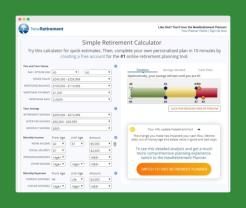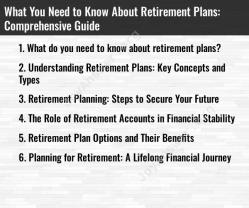Should I buy an annuity for retirement income?
Whether or not you should buy an annuity for retirement income depends on your individual financial situation, goals, and preferences. Annuities can be a useful financial tool for some retirees, but they may not be suitable for everyone. Here are some factors to consider when deciding if an annuity is right for your retirement income strategy:
1. Financial Goals and Needs:
- Assess your retirement financial goals and income needs. Annuities can provide a steady stream of income, which can be beneficial if you want predictable, regular payments to cover essential expenses.
2. Risk Tolerance:
- Annuities are typically low-risk investments, making them a suitable option for individuals with a low tolerance for market volatility. If you're risk-averse and want to protect your principal, an annuity might align with your risk profile.
3. Diversification:
- Consider how annuities fit into your overall retirement portfolio. They can complement other investments, such as stocks and bonds, by providing stability and income diversification.
4. Liquidity Needs:
- Annuities often come with restrictions on liquidity. Be sure to assess whether you need access to your funds for unexpected expenses or emergencies before committing to an annuity.
5. Investment Time Horizon:
- Annuities are designed for the long term. If you have a long retirement ahead, an annuity can provide income for life. However, if you have a shorter life expectancy or need access to your money sooner, other options might be more appropriate.
6. Types of Annuities:
- There are various types of annuities, including immediate, deferred, fixed, variable, and indexed annuities. Each type has its features and benefits. Research and choose the one that aligns with your needs and preferences.
7. Inflation Protection:
- Consider whether the annuity offers protection against inflation. Without inflation adjustments, the purchasing power of your annuity payments may decrease over time.
8. Fees and Costs:
- Understand the fees associated with the annuity, including management fees, surrender charges, and any other expenses. These costs can affect your overall returns.
9. Tax Implications:
- Annuity income may have tax implications. Consult with a tax advisor to understand how annuity income will be taxed and whether it affects your overall tax strategy.
10. Legacy Planning:- Annuities are primarily designed to provide income during your lifetime. If leaving a significant legacy to heirs is a priority, consider how an annuity fits into your estate plan.
11. Shop Around:- Compare annuity offers from different providers to find the one that offers the most favorable terms and features for your specific needs.
12. Seek Professional Advice:- Consult with a financial advisor or retirement planner who can assess your individual circumstances and provide personalized guidance on whether an annuity is a suitable option for your retirement income plan.
Annuities can be a valuable tool in retirement planning, but they are not one-size-fits-all solutions. It's essential to carefully evaluate your financial situation and objectives and consider how an annuity aligns with your overall retirement strategy before making a decision.










